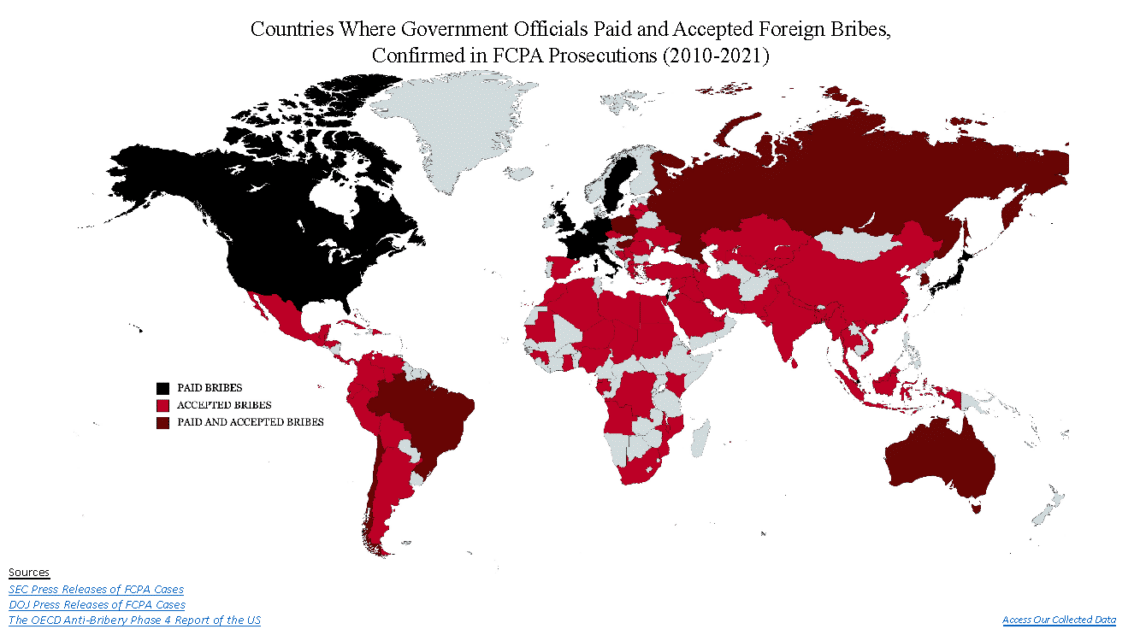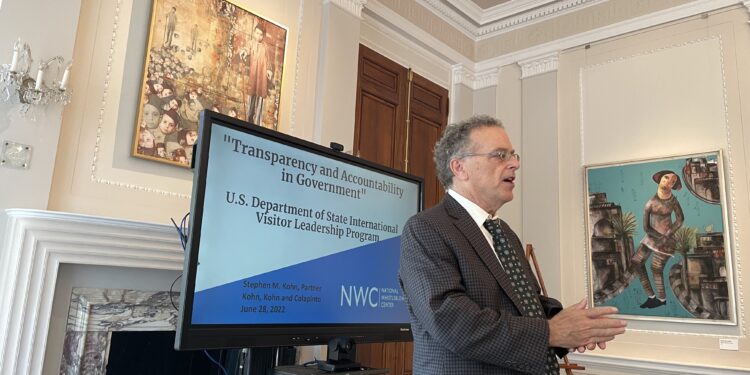On June 28, internationally renowned whistleblower attorney Stephen M. Kohn discussed the importance of whistleblowers in the fight against international corruption. A group of delegates from 15 countries attended the Meridian International Center’s event sponsored by the U.S. State Department’s International Visitor Program. Kohn is a partner at the whistleblower law firm of Kohn, Kohn and Colapinto, and one of the founders of the National Whistleblower Center in Washington, D.C. His presentation, “Transparency and Accountability in Government,” instigated a heated discussion among the delegates about the challenges faced by their countries in their fight against corruption. The range of comfort among the representatives in considering whistleblower policies reflected their countries’ different stages in building democratic institutions and the level of security. Some of their questions demonstrated a reluctance to implement whistleblower laws. At the same time, other delegates endorsed whistleblowing but expressed reservations about the applicability of whistleblower laws in their countries, given their weak rule of law.
A delegate from Israel expressed reservations about whistleblowing as an effective tool for fighting corruption due to the issue of frivolous whistleblower claims. Kohn explained that frivolous claims are highly unlikely as people are discouraged from bringing false claims because of the extensive procedures needed for filing claims. Also, according to the rules of confidentiality U.S. False Claims Act (FCA) cases are filed under seal; this prevents the whistleblower from blackmailing the company with a frivolous claim.
Kohn explained that the government agencies that oversee whistleblower claims in the U.S. have limited resources to investigate. Therefore, they judiciously select cases and weed out possible frivolous claimants with the help of extensive procedures for filing claims. Agencies will scrutinize allegations to determine if they are sufficient to build a successful case. This scrutiny makes it unlikely that a whistleblower could take advantage of the reward laws by simply fabricating allegations against a company.
While whistleblower laws incentivize people to report fraud, there are also appropriate measures to discourage frivolous claims. These measures include provisions mandating that whistleblowers pay the company’s attorney fees if they showed bad faith in a resulting unsuccessful case. Moreover, a falsely accused company is allowed to take legal action if a whistleblower is proven to have fraudulently filed a claim. Finally, a frivolous whistleblower claim will not result in large fines or penalties, so there will not be a significant financial incentive for a person to pursue this action.
A delegate from Slovakia explained that there was debate surrounding the morality of whistleblowing in the Slovak parliament. In response, Kohn explained that reward laws incentivize whistleblowers. It is more important to consider the larger good achieved in reducing corruption than to dwell on how individuals could use whistleblower reward laws for self-interest.
A delegate from Kenya shared three whistleblower stories that ended badly. In one such case, the whistleblower was killed after coming forward to the authorities. She pointed out how dangerous whistleblowing is in her country due to the lack of security. In response, Kohn presented an approach to reduce the risk to the whistleblower. He explained that the whistleblower’s identity might be less evident if the government proceeds slowly in its investigation. The company may not even expect that a report by a whistleblower instigated the investigation. This way, the whistleblower can act as a confidential informant, reporting ongoing fraud and allowing greater fines and penalties.
Kohn’s presentation included a map of “Countries Where Government Officials Paid and Accepted Foreign Bribes.” He used this to dispel the myth that only poorer countries participate in corruption. Looking at Transparency International’s corruption perceptions index, one would inevitably conclude that corruption is only a problem in the developing world. However, the map changes the narrative on corruption and shifts the paradigm by including richer countries that have paid bribes. These countries encourage and orchestrate corruption through bribery of government officials in countries with weak legal institutions.

After seeing the statistics comparing money collected by the government versus whistleblowers utilizing the FCA, the Israeli delegate inquired about data showing the amount of FCA claims filed over the years. He hypothesized that over the years, the amount of FCA claims should decrease because all the bad actors would be caught. Kohn explained that there will always be fraudsters with new corruption schemes. Also, more international whistleblowers are using U.S. laws to fight corruption and will continue to increase the number of FCA claims filed.
A delegate from Guyana asked what happens to whistleblowers who signed non-disclosure agreements. Kohn explained that the whistleblower has a right to report fraud to law enforcement despite any restrictive contracts, thanks to the Obstruction of Justice statute. However, whistleblowers can get in trouble if they go to the press or try to blackmail the company with revealing documents subject to non-disclosure agreements.
A delegate from Italy asked for clarification on climate-related disclosures. The U.S. Securities and Exchange Commission (SEC) is considering including climate-related disclosures in a rule that mandates companies to disclose certain violations and risks to their investors. This rule would broaden SEC’s enforcement capabilities. Using this opportunity, Kohn also reviewed a proposed related action rule. This rule would allow whistleblowers to collect rewards from an enforcement action pursued by two different agencies at a reduced rate.
Conversations with international delegates, such as this one, are important, says Kohn, “If you want an effective anti-corruption program, you must have whistleblowers. Discussing the use of U.S. laws to fight corruption in counties without adequate whistleblower laws is key to fighting corruption internationally,” said Kohn.




